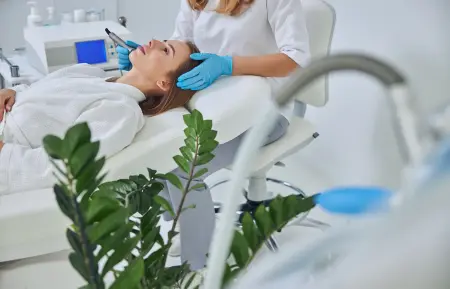GMC Registered Doctors
Expert & Confidential Care
Discreet & Private Clinic
Your Privacy Assured
Evidence-Based Management
Effective Treatment Options
CQC Regulated Clinic
Safe & Professional Environment
Understanding Genital Warts: Definition, Causes, and Development
Genital warts are small, flesh-coloured or greyish growths that appear in the genital area. They represent one of the most common sexually transmitted conditions worldwide and are caused by certain strains of the human papillomavirus (HPV). While physically benign in most cases, genital warts can cause emotional distress and may require professional assessment and management.
At Revitalise London, our GMC registered doctors provide discreet, professional assessment and information about genital warts and their management options. Our CQC-regulated Harley Street clinic delivers comprehensive care with a focus on patient dignity, privacy, and wellbeing.
Scientific Understanding of Genital Warts: Causes and Transmission
Understanding the virus and how it spreads is key to management and prevention.
Genital warts are caused by specific HPV types, most commonly types 6 and 11.
- HPV is a very common group of viruses (>200 types), with ~40 affecting the genital area.
- Wart-causing strains (low-risk) are usually different from cancer-associated strains (high-risk).
- Most sexually active people encounter HPV; many conditions caused by HPV are asymptomatic and clear naturally.
Transmission:
- Primarily through direct, intimate skin-to-skin contact (vaginal, anal, oral sex).
- Less commonly via shared items or mother-to-baby during birth.
Risk Factors for Developing Warts After Exposure:
- Multiple sexual partners.
- Compromised immune system.
- Existing genital skin conditions/irritation.
- Smoking.
- Hormonal changes (e.g., pregnancy).
Our GMC registered doctors provide personalised information on risk reduction.
Identifying Genital Warts: Appearance and Symptoms
Recognising signs is important, but professional diagnosis is crucial as other conditions can look similar.
Common Characteristics
- Small, flesh-coloured, grey, or pinkish growths.
- Smooth or rough texture; may resemble cauliflower if clustered.
- Flat or raised; single or multiple lesions.
- Typically painless, but can occasionally itch, cause discomfort, or bleed.
Locations
Female Anatomy: Vulva, vagina (inside/around), cervix, anus (around), upper thighs.
Male Anatomy: Penis, scrotum, anus (around), upper thighs, urethra (rarely).
All Individuals: Mouth or throat (less common, via oral contact).
When to Seek Professional Assessment
- Notice any new or unusual genital/anal growths.
- Experience unexplained itching, discomfort, or bleeding in these areas.
- Had sexual contact with someone known to have HPV/warts.
- General concerns about sexual health.
At Revitalise London, our GMC registered doctors offer discreet, thorough assessments.
The Natural Course of Genital Warts: What to Expect
Understanding the typical progression helps manage expectations:
Incubation Period
Warts typically appear 1 to 8 months after the condition caused by HPV begins, but can take up to 2 years. Pinpointing exposure time is often difficult.
Natural Evolution (Without Treatment)
- Spontaneous Resolution (~1/3): Warts may clear on their own within 6-24 months via immune response.
- Persistence (~1/3): Warts remain unchanged.
- Growth/Spread (~1/3): Warts increase in size or number.
- Recurrence: Possible even after clearance, as the virus can remain dormant.
Professional assessment helps determine the best approach for your situation.
Professional Assessment: What to Expect
Our comprehensive, confidential assessments by GMC registered doctors include:
A discreet discussion covering:
- Detailed medical and sexual health history.
- Symptoms and concerns.
- Explanation of the examination.
- Opportunity for questions in a non-judgemental space.
With your consent, a thorough examination involving:
- Visual inspection of external genital/anal areas.
- Internal examination (vaginal/anal) if appropriate.
- Use of magnification if needed.
- Possible application of mild acetic acid solution to highlight subtle warts.
- Chaperones available upon request.
Depending on circumstances, we may recommend:
- Testing for other sexually transmitted conditions (STIs).
- Pap smear (for individuals with a cervix).
- Biopsy (rarely, if diagnosis is uncertain or features are concerning).
Our priority is your comfort, dignity, and privacy throughout.
Management Approaches: Information and Options
Various approaches exist, tailored to wart location, size, number, and patient factors by our GMC registered doctors.
Professional Management Options
Medical management approaches may include:
- Topical Medications: Prescription creams/solutions applied in-clinic or for home use (e.g., podophyllotoxin, imiquimod, sinecatechins).
- Immune Response Modifiers: Medications that help the body’s immune system fight the virus (e.g., imiquimod).
- Combination Approaches: Using multiple methods for potentially better outcomes, especially for resistant warts.
All options are performed or recommended by GMC registered doctors in our CQC-regulated facility, focusing on effectiveness, comfort, and minimising recurrence.
Expectation Management
It’s important to understand:
- Complete clearance often requires multiple treatment sessions.
- The goal is clearing visible warts; the underlying presence of HPV may persist.
- Recurrence is possible even after successful treatment.
- Follow-up appointments are crucial for monitoring and managing recurrence.
Our doctors provide realistic information about outcomes based on your specific situation.
Prevention, Reducing Risk & Emotional Support
Strategies for prevention and managing the emotional impact of genital warts:
- Vaccination: HPV vaccine prevents the condition caused by common wart-causing types (most effective before exposure).
- Barrier Methods: Consistent/correct use of condoms/dental dams reduces (but doesn’t eliminate) risk.
- Regular Health Screenings: Allows early detection/management of STIs.
- Open Communication: Honest discussion with partners about sexual health.
Our doctors offer personalised prevention advice.
Common Reactions:
- Embarrassment, shame, anxiety about disclosure.
- Concerns about future relationships or health implications.
- Confusion about transmission source.
Coping Strategies:
- Seek accurate, evidence-based information.
- Discuss concerns openly with healthcare providers.
- Connect with support resources if needed.
- Remember HPV is extremely common.
We provide compassionate, non-judgemental care addressing both physical and psychological wellbeing.
Why Choose Revitalise London for Genital Wart Assessment?
Providing medical excellence with privacy and discretion.
Medical Excellence & Confidential Care
Choosing the right clinic for sensitive health concerns is important. At Revitalise London, we focus on accurate diagnosis, effective evidence-based management, and a supportive, confidential patient experience.
Medical Excellence
Board-certified doctors with specialised training in sexual health, managing complex cases according to the latest evidence-based practices.
Privacy and Discretion
Confidential appointments, private consultation rooms, discreet location, and strict data protection protocols ensure your privacy.
Comprehensive Care
Thorough assessment, evidence-based management, emotional support, prevention strategies, and follow-up care.
CQC Registration & Quality Assurance
Our CQC regulation ensures adherence to rigorous standards for safety, hygiene protocols, governance, and continuous quality improvement.

Frequently Asked Questions About Genital Warts
Answers to common queries about HPV and genital warts.
Genital warts typically develop 1-8 months after the initial condition caused by HPV begins, though it can take up to two years. This delay makes it hard to pinpoint the exact time of exposure.
Yes, many people carry HPV without ever developing visible warts or symptoms. The virus can be present in the skin and potentially transmissible even without signs.
Not necessarily. Treatment removes visible warts, but the HPV virus can remain dormant in skin cells. This means warts can recur later, and transmission might still be possible, though the risk is lower when no warts are present.
The HPV types causing most genital warts (6 & 11) are considered low-risk and are not typically linked to cancer. High-risk HPV types, which are different, are associated with certain cancers.
Consistent and correct condom use reduces the risk but doesn’t eliminate it entirely, as HPV can affect skin not covered by the condom. They remain crucial for reducing overall STI transmission risk.
Yes, having genital warts does not affect fertility. Rarely, extensive warts during pregnancy might require specific delivery considerations, but this is uncommon.
It’s generally advised to avoid sexual contact while warts are present and undergoing management to reduce transmission risk and prevent irritation. Discuss personalised guidance with your doctor.






